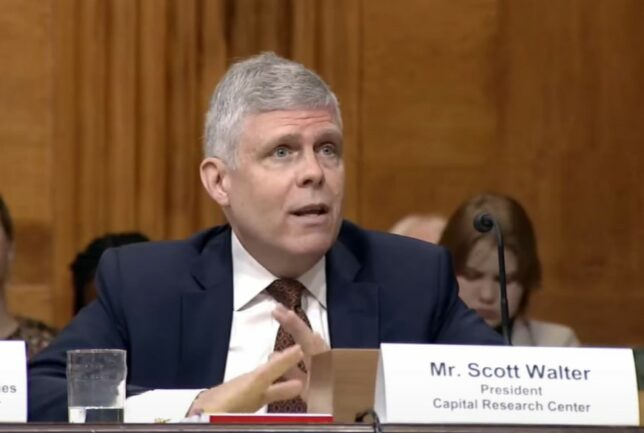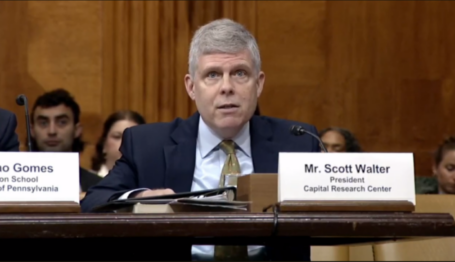Testimony
Transcript of Scott Walter’s Testimony Before the Senate Budget Committee


Scott Walter’s Testimony Before the Senate Budget Committee
Written Statement: HTML or PDF
Oral Testimony: Video and transcript (below)
Full Committee Hearing (Senate website)
Questions for the Record
Transcript of Oral Testimony
To Senate Budget Committee
Sen. Sheldon Whitehouse, Chairman
Scott Walter
President, Capital Research Center
June 21, 2023
Chairman Whitehouse, Ranking Member Grassley, distinguished members of the Committee, thank you for the honor of testifying. I’m president of the Capital Research Center, and we’ve studied political money debates for decades, including of course, Mr. Chairman, your speeches and writings.
“Dark money” isn’t really mysterious—unless you count that rumor that Leonard Leo invented “dark money” in a lab in Wuhan! No, to say that a group uses “dark money” is like saying the group uses telephones—it’s a universal technology.
Oddly, the people who most often use the term never define it with legal precision, even when they’re speaking in a Judiciary Committee hearing or a Senate Finance hearing, where that would seem necessary. But if you’re trying to scare others with a bogeyman, best to keep the monster’s outline shadowy.
Now if “dark money” be a monster, it’s not a large one. The biggest number I can find is OpenSecret’s $1 billion in 2020.[i] Which sounds big until you see OpenSecrets’ number for the “hard” dollars disclosed to the FEC, which makes the “dark money” bogeyman about 7 percent of election spending.[ii]
So, “dark money” is universal in politics, and not a large part of politics, but “dark money” is not equally—if I were a man of the Left, I’d say, not fairly—distributed. It tilts strongly left toward the Democratic Party. A few simple stats:
- OpenSecrets’ totals for “dark money” in the 2020 election show almost a two-and-a-half-to-one Democratic advantage.[iii]
- In just the presidential race, Mr. Biden enjoyed six times the “dark money” of his opponent.[iv]
- The Democrats had a “dark money” advantage in the 2022 cycle, the 2020, the 2018.[v]
Here’s another example: Mr. Chairman, the conservative judicial activist you especially target received in 2021 a 1.65 billion donation to a (c)(4) “dark money” group,[vi] but just weeks after that story broke, a left-wing billionaire gave about twice that amount to a “dark money” group on the left. [vii]
A better comparison for that 1.65 billion is the money raked in by the Left’s biggest nonprofit network: the empire run by Arabella Advisors.[viii] It raised almost exactly the same amount the same year. The year before it raised 1.7 billion dollars. So what the Chairman’s special target enjoyed as a once-in-a-lifetime windfall is just the yearly take for Arabella.[ix]
Again, I’m arguing (c)(4) “dark money” is not a big deal in American politics, but if anyone insists it pollutes our politics, then the Big Polluter is the Democratic Party, and the strongest drivers of Big Pollution are environmentalists. For instance, the Arabella network was founded by environmentalist Eric Kessler, who’s deeply tied as well to the “dark money” League of Conservation Voters—which is both one of the biggest sources of campaign contributions to the Chairman and also a “dark money heavyweight,” says the Center for Public Integrity.[x]
Another strong environmentalist tie at Arabella: The Sierra Club helped launch Arabella’s 1630 Fund, “the indisputable heavyweight of Democratic dark money,” says The Atlantic.[xi]
Arabella’s environmentalist ties do have an unusual and especially disturbing feature: foreign “dark money.” One of Arabella’s top donors for two decades is the environmentalist Hansjörg Wyss, a foreign national who’s admitted violating bans on foreign money in American politics in the past[xii] and now funds Arabella’s network to influence our politics.
Still, “dark money” and all money in politics is simple: People who believe in causes raise money for those causes, start groups for those causes, collaborate with each other, buy ads to persuade the public, support their champions, criticize their opponents. When the Chairman takes money from the League of Conservation Voters, that doesn’t mean the League has “captured” him. It means they agree with him.
The people on the other side of the issues operate the same way, using the same kind of—if not nearly as much of—various types of political money. So to act outraged they’re using “dark money” reveals the real definition of “dark money”: support for speech the Left wants to silence.
Trying to silence one’s opponents is the opposite of democracy. But it’s understandable, given how unpopular some of the Left’s—especially environmentalists’—agenda items are. The ESG movement, for example, funded with millions from billionaires like George Soros[xiii] and millions from the Arabella network,[xiv] is currently trying to have banks stop loans to any company related to fossil fuels,[xv] which would mean Americans couldn’t buy gas for their cars and trucks, and might have an effect on the federal budget!
Trying to stifle speech with the bogeyman of “dark money” drives debate away from the substance of issues to issues of money. I urge the Committee instead to focus on the substance of issues like climate change.
Thank you.
[i] Anna Massoglia and Karl Evers-Hillstrom, “‘Dark Money’ Topped $1 Billion in 2020, Largely Boosting Democrats,” OpenSecrets, March 17, 2021, https://www.opensecrets.org/news/2021/03/one-billion-dark-money-2020-electioncycle/.
[ii] Karl Evers-Hillstrom, “Most Expensive Ever: 2020 Election Cost $14.4 Billion,” OpenSecrets, February 11, 2021, https://www.opensecrets.org/news/2021/02/2020-cycle-cost-14p4-billion-doubling-16/.
[iii] Massoglia and Evers-Hillstrom, “‘Dark Money’ Topped $1 Billion in 2020.”
[iv] Fredreka Schouten, “Democrats Deride ‘Dark’ Money, but a New Analysis Shows It Helped Boost Joe Biden,” CNN Politics, November 27, 2020, https://www.cnn.com/2020/11/27/politics/dark-money-democrats-joe-biden/index.html.
[v] Kenneth P. Vogel and Shane Goldmacher, “Democrats Decried Dark Money. Then They Won With It in 2020.,” New York Times, January 29, 2022, https://www.nytimes.com/2022/01/29/us/politics/democrats-dark-money-donors.html.
[vi] Kenneth P. Vogel and Shane Goldmacher, “An Unusual $1.6 Billion Donation Bolsters Conservatives,” New York Times, August 22, 2022, https://www.nytimes.com/2022/08/22/us/politics/republican-dark-money.html.
[vii] David Gelles, “Billionaire No More: Patagonia Founder Gives Away the Company,” New York Times, September 14, 2022, https://www.nytimes.com/2022/09/14/climate/patagonia-climate-philanthropy-chouinard.html.
[viii] InfluenceWatch, “Arabella Advisors,” https://www.influencewatch.org/for-profit/arabella-advisors/.
[ix] InfluenceWatch, “Arabella Advisors: Network Financial Overview,” https://www.influencewatch.org/for-profit/arabella-advisors/#network-financial-overview.
[x] Michael Beckel. “League of Conservation Voters Becoming ‘Dark Money’ Heavyweight, November 22, 2013, https://publicintegrity.org/federal-politics/league-of-conservation-voters-becoming-dark-money-heavyweight/.
[xi] InfluenceWatch, “Sixteen Thirty Fund (1630 Fund),” https://www.influencewatch.org/non-profit/sixteen-thirty-fund/.
[xii] Federal Election Commission, “First General Counsel’s Report,” MUR 7904, June 28, 2022, p. 3, https://www.influencewatch.org/app/uploads/2023/06/FEC-gen-counsel-report-on-APT-Wyss-complaint.pdf.
[xiii] For example, Soros’s Open Society foundations have given seven-figures in donations to As You Sow, one of the most prominent ESG groups. Open Society Foundations, “Awarded Grants,” search on “as you sow,” https://www.opensocietyfoundations.org/grants/past?filter_keyword=as+you+sow.
[xiv] For example, Arabella’s New Venture Fund has given almost $7.3 million to Ceres, a prominent ESG group, from 2017 to 2021. InfluenceWatch, “New Venture Fund (NVF): Grants from New Venture Fund,” https://www.influencewatch.org/non-profit/new-venture-fund/#grants-from-new-venture-fund.
[xv] In 2022, 10 different banks had received proposals asking them to stop financing or underwriting such projects. See Brigid Rosati, Kilian Moote, Rajeev Kumar, Michael Maiolo, and Georgeson, “A Look Back at the 2022 Proxy Season,” Harvard Law School Forum on Corporate Governance, February 14, 2023, https://corpgov.law.harvard.edu/2022/10/23/a-look-back-at-the-2022-proxy-season/.

